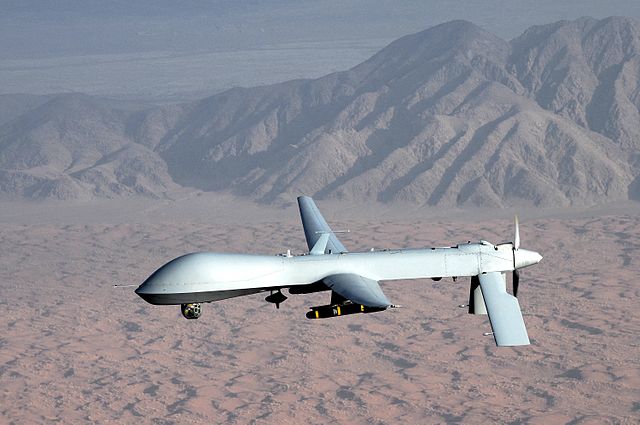The DC Circuit Refuses to Adjudicate TVPA Claim Regarding the Lawfulness of Extrajudicial Killings
As Quinta Jurecic reported Friday, in Jaber v. United States, the U.S. Court of Appeals for the D.C.

Published by The Lawfare Institute
in Cooperation With

As Quinta Jurecic reported Friday, in Jaber v. United States, the U.S. Court of Appeals for the D.C. Circuit held that the political question doctrine bars the adjudication of claims regarding a 2012 U.S. drone strike in Yemen. While that ruling is consistent with D.C. Circuit precedent, it improperly refuses to adjudicate a claim duly enacted by Congress under the Torture Victim Protection Act (“TVPA”), which requires federal courts to hear claims of extrajudicial killing in other countries taken under the color of foreign law. Courts, understandably, may be very uncomfortable in that role, but they cannot duck their responsibility (at least without the Executive’s invocation of a state secrets defense) based on the danger that TVPA claims may involve military, foreign affairs or political judgments. TVPA claims inherently involve sensitive foreign affairs and/or military matters. If Congress wanted to provide an out for matters too sensitive, it could have done so. And maybe it should have. But it is not the job of the courts to read in exceptions that are not in the statute.
The Claim
Plaintiffs, surviving family members of the victims, claim that Salem Bin Ali Jaber and Waleed bin Ali Jaber were mistakenly killed in a drone strike aimed at three extremists in 2012. Plaintiffs assert that once U.S. officials recognized their error, Yemeni officials offered to compensate the Jabers’ relatives for their loss with $55,000 worth of Yemeni currency and then later $100,000 in U.S. currency. The Yemeni official said the $100,000 was from the U.S. government, but then backed off that assertion when the family asked for this admission of U.S. involvement in writing.
In their civil complaint, plaintiffs assert claims under the TVPA and the Alien Tort Statute. Plaintiffs appear not to be seeking any damages, but instead only a declaration that the Jabers’ deaths constitute extrajudicial killings in violation of the TVPA and international law. The TVPA permits suit against an “individual who, under actual or apparent authority, or color of law, of any foreign nation … subjects an individual to extrajudicial killing,” where "extrajudicial killing" is defined as “a deliberated killing not authorized by a previous judgment pronounced by a regularly constituted court affording all the judicial guarantees which are recognized as indispensable by civilized peoples.” Notably, the TVPA offers a statutory defense to a claim of extrajudicial killing committed under the color of foreign law by expressly excluding “any such killing that, under international law, is lawfully carried out under the authority of a foreign nation.”
To satisfy the requirement that the claimed extra-judicial killings were undertaken under color of foreign law, plaintiffs allege that the drone strike was executed by the U.S. “under the actual or apparent authority of the Republic of Yemen, pursuant to the approval of the strike by the President of Yemen.”
The Courts Reject the Claim
Judge Ellen Segal Huvelle of the U.S. District Court for the District of Columbia dismissed the claims, holding that, under D.C. Circuit precedent, the political question doctrine applies equally to statutory claims and that here the claims could not be adjudicated because they involve the assessment of military and political decisions. In an opinion for the court by the very conservative Judge Janice Rogers Brown (joined in full by Obama-appointed Circuit Judges Sri Srinivasan and Cornelia Pillard), the D.C. Circuit now affirms. The court explained: “While Plaintiffs clearly assert claims under the TVPA and ATS, the precise grounds they raise in their Complaint call for a court to pass judgment on the wisdom of Executive’s decision to commence military action—mistaken or not—against a foreign target.” The court concluded: “If the political question doctrine means anything in the arena of national security and foreign relations, it means the courts cannot assess the merits of the President’s decision to launch an attack on a foreign target, and the plaintiffs ask us to do just that.”
Judge Brown added a separate concurrence where she bemoans the lack of any meaningful check on the government’s ability to conduct targeted killings: “if judges will not check this outsized power, then who will?” She candidly remarks that “congressional oversight is a joke—and a bad one at that.” Judge Brown, nonetheless, says that the “Executive and Congress must establish a clear policy for drone strikes and precise avenues for accountability.” According to her, the “Judiciary bound by precedent and constitutional constraints” has done all it permissibly can. “It is up to others to take it from here.”
But have the courts really done all that they can?
Is the D.C. Circuit Right?
As noted above, the TVPA “does not include any such killing that, under international law, is lawfully carried out under the authority of a foreign nation.” Thus, Congress plainly contemplated that our courts would address and resolve the legality of extra-judicial killings occurring in foreign countries. The legality of a U.S. drone strike in Yemen (allegedly undertaken with the cooperation of the local government) is a question of law properly raised under the TVPA, which a court can opine upon. We know that there are memoranda from the Department of Justice’s Office of Legal Counsel that address that very legal question. As such, the government could have argued here that, even if a court assumes the facts as alleged by the plaintiffs, the killings alleged were lawful under international law and that on that basis the claims should be dismissed. And a court given the role of deciding that issue by Congress can address and decide that issue.
A court could also properly decide whether, under the facts alleged, the alleged killings should be considered as taking place solely under color of U.S. law, not at all under the color of foreign law, even if done in consultation or concert with Yemen (an issue the government argued as a defense in the alternative here). Courts have ruled against TVPA claims on this basis before, notably in Schneider v. Kissinger, 310 F.Supp. 2d 251, 267 (D.D.C. 2004) ("Dr. Kissinger was most assuredly acting pursuant to U.S. law ... despite the fact that his alleged foreign co-conspirators may have been acting under color of Chilean law."), aff'd on other grounds, 412 F.3d 190 (D.C. Cir. 2005); and Arar v. Ashcroft, 585 F. 3d 559, 568 (2d Cir. 2009) (en banc) (“Arar must adequately allege that the defendants possessed power under Syrian law, and that the offending actions (i.e., Arar's removal to Syria and subsequent torture) derived from an exercise of that power, or that defendants could not have undertaken their culpable actions absent such power”). That argument has, however, been criticized as contrary to established Section 1983 “color of law” principles, which arguably were incorporated into the TVPA.
But instead of reaching either of these key threshold legal issues, the court in Jabar here held that the TVPA claim was inherently nonjusticiable and must be dismissed out of the gate. The Supreme Court, however, has recently emphasized that where a duly enacted statute creates a cause of action and grants federal courts with jurisdiction, the courts do not have discretion to punt: “When a federal court has jurisdiction, it also has a ‘virtually unflagging obligation ... to exercise’ that authority.” Matta v. Lynch, 135 S.Ct. 2150, 2156 (2015).
The court here cited two prior D.C. Circuit rulings to show its hands were tied. First, the court relies upon El-Shifa Pharmaceutical Industries Co. v. United States, 607 F.3d 836 (D.C. Cir. 2010). There, the court held, ““[t]he political question doctrine bars our review of claims that, regardless of how they are styled, call into question the prudence of the political branches in matters of foreign policy or national security constitutionally committed to their discretion,” and that even “a statute providing for judicial review does not override Article III’s requirement that federal courts refrain from deciding political questions.” That case involved a claim asserted under the Federal Tort Claims Act (“FTCA”) regarding a military attack on the El-Shifa manufacturing plant in Sudan—an attack based on claims that the plant was tied to Osama bin Laden and functioned as part of his al Qaeda network.
Notably, the FTCA does not contemplate U.S. courts adjudicating the legality of killings or attacks in other countries. To the contrary, it bars claims where the injury occurred outside of the United States. Thus, it hardly stands as a congressional invitation to weigh on the legality of military actions in foreign countries. In contrast, the TVPA expressly tasks our courts with adjudicating the legality of acts undertaken in other countries: the act’s whole mission is to provide a forum in U.S. courts for claims of torture and extrajudicial killing abroad. Given that congressional mandate, can our courts properly say no thank you to that authority based on their own concepts of what is too political?
The second case cited by the court in Gonzales-Vera v. Kissinger, 449 F.3d 1260 (D.C. Cir. 2006), a case that I briefed and argued before the D.C. Circuit when I was at the Department of Justice. In that case, the Court directly addressed the TVPA and held that the TVPA claims there asserted against Henry Kissinger could not be adjudicated because foreign policy choices permeated plaintiff’s claims. The Court held that a TVPA claim, “like any other, may not be heard if it presents a political question.”
I agree that the Gonzales-Vera likely foreclosed the TVPA claims here. The question now is whether the full Court should rehear the case to decide the ongoing vitality of Gonzales-Vera.
In my opinion, the D.C. Circuit would be well advised to grant rehearing en banc to revisit the question of how, if at all, the political question doctrine applies to TVPA claims of torture and extrajudicial killing. No doubt that a court cannot review the decision of whether there is sufficient factual evidence to tie a target to al Qaeda. Whether or not conducting executions in Yemen is legal under international law, however, represents a threshold legal question that a court can make—and which the TVPA contemplates a court may decide in regard to killing undertaken under color of foreign law. As noted above, a court could also decide whether U.S. officials carrying out in intelligence or military mission in coordination with another country can properly be considered acting under “color of foreign law.” It seems a mistake to cut off the statutory cause of action here at this early stage given the congressional empowerment of the courts under the TVPA, especially without the government even asserting the State Secrets privilege.
The full court of appeals should now grant en banc review to decide whether the appellate panel here was correct in holding that it has authority to simply decline to adjudicate the TVPA claims asserted in this case. And if the court of appeals refuses to revisit the question, the Supreme Court may want to weigh in.



.jpg?sfvrsn=8588c21_5)
-final.png?sfvrsn=b70826ae_3)
